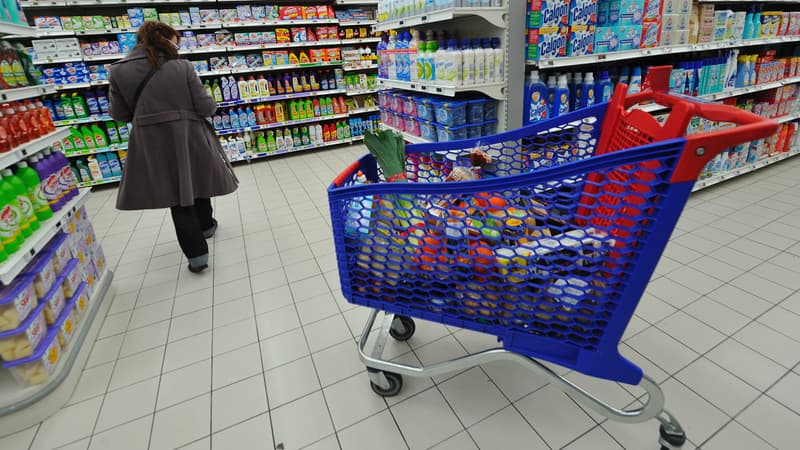Since Monday, the National Assembly is examining a bill to advance trade negotiations between large manufacturers and supermarkets, with the aim of lowering prices on the shelves, but with a result not guaranteed, even if inflation slows down. .
For the fourth time in five years, Parliament will examine the legislation governing these trade negotiations.
Every year, in a rat race, they allow, after several weeks of bitter discussions, to set the conditions (purchase price, shelf space, promotion calendar, etc.) under which E.Leclerc, Carrefour, Intermarché or Système U will be supplied. throughout the year from its suppliers.
The Government intends to advance to January 15, instead of March 1, the date on which negotiations must conclude for 2024.
Price war
The majority of products sold in supermarkets are affected by these annual negotiations: products from so-called national brands, such as Danone, Nutella, Nescafé or Cochonou, for example. These products represent, for example, two thirds of Carrefour’s sales.
The objective of the previous laws on the matter, Egalim 1 (2018) and 2 (2021), and more recently Descrozaille, aimed, on the one hand, to prevent agricultural producers from paying the price of the price war and, on the other hand, another, to reinforce the weight of manufacturers in the face of mass distribution.
But especially since the Russian invasion of Ukraine, food inflation has become a major issue in France.
By mid-2022, the government had pressured all companies to renegotiate upwards during the year to better remunerate manufacturers facing rising costs.
In 2023, this time it intervened to request the downward transfer of a certain number of wholesale prices, without this translating into significant reductions in shelf prices. Hence the desire to advance the 2024 calendar a month and a half, in the hope of seeing lower prices on shelves more quickly.
Even for a specific calendar change, it is necessary to go to law because the usual deadline appears in the Commercial Code.
The government had announced that it only wanted to advance the calendar for the 75 largest manufacturers.
Demands on the rise
However, Ilec, which carries the voice of these giants in France, has already warned that the result of the negotiations would be “contrasted”, since some wholesale markets would continue to “increase”, its general director Richard Panquiault explained at the end of September. at RMC.
The food distribution leader E.Leclerc had only received requests for sales conditions “increased, in some cases up to 15%” from its suppliers on Thursday, its press representative, Michel-Edouard Leclerc, added on BFMTV on Thursday. /RMC.
This raises “concern” among Thierry Cotillard, director of the Intermarché/Les Mousquetaires group, about the ability of distributors to “get deflation.”
He even mentioned the possibility of a price increase “between zero and four” percent on Sunday in the RTL-Le Figaro-M6 Grand Jury room, which would be the opposite of the intention of the bill.
Furthermore, the differential treatment of large manufacturers is problematic for some: “the multinationals will cannibalize the budgets of large retailers and monopolize a large part of the available space on the shelves,” fears the president of the FEEF (Federation of Companies and Entrepreneurs). of France), Léonard Prunier, who asks that the little ones go before the big ones.
“The bill does not change much in essence”
ADEPALE, an association of French SMEs and ETIs in the food sector, called on Tuesday for “the elimination of the thresholds for establishing trade negotiations (150 million turnover)” which, according to the text examined by the Assembly, should make it possible to differentiate between industrialists big and less big.
The deadline for negotiations is also being debated.
“The bill does not change much in essence,” said Michel-Edouard Leclerc. Some people advocate being able to negotiate year-round.
However, food inflation is showing signs of slowing. Some shelf prices are even starting to fall, although at much smaller rates than the increases of the last two years.
Both manufacturers and supermarkets consider that, in any case, it is very unlikely that a return to 2019 prices will occur.
Source: BFM TV


